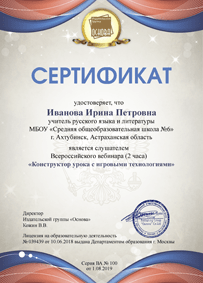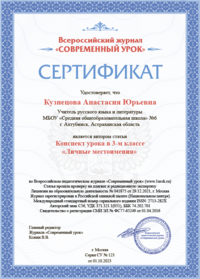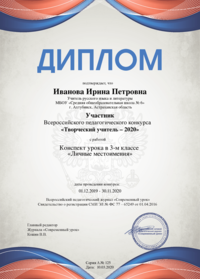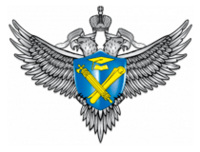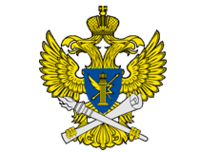«Stationmethode» как один из методов развития универсальных учебных действий обучающихся на уроке английского языка
Автор: Панарина Елена Петровна
Организация: МАОУ СОШ № 40
Населенный пункт: Свердловская область, г. Нижний Тагил
Учить учиться нужно на всех школьных предметах, но развитие учебных умений на уроках иностранного языка (ИЯ) особенно важно, что объясняется спецификой предмета.
Овладение ИЯ происходит вне языковой среды при ограниченном количестве часов, когда на одного ученика приходится в среднем одна - две минуты говорения за весь урок. Рассчитывать на успех в таких условиях можно только в случае, если учащийся будет обучен работать самостоятельно на протяжении всего урока в школе и продуктивно организовывать работу над языком дома.
В данной статье представлена разработка урока - «Англия и Шотландия - две страны Соединённого Королевства», который является иллюстрацией использования «метода станций» для развития УУД учащихся.
Метод «Stationmethode» или «станционный метод» решает задачу отхода от традиционного сидения за партой, так как учащиеся имеют возможность двигаться в процессе выполнения заданий. Практически воплощается идея о формировании у ученика способности взять на себя управление своей деятельностью: самостоятельно инициировать ее, ставить адекватные цели и задачи, находить необходимые средства, оценивать результаты, осуществлять самокоррекцию и, главное, нести ответственность за принятие решений и их выполнение. Учитель направляет действия учащихся, выполняя функцию консультанта.
Цель урока: развитие универсальных учебных действий обучающихся путем выполнения деятельностных заданий.
Планируемые результаты:
Предметные умения
- Умение правильно понимать значение лексических единиц (ЛЕ) по теме.
- Умение использовать ЛЕ в заданной ситуации.
- Умение задавать нужный тип вопроса.
- Умение строить монологическое высказывание по заданной теме.
Личностные УУД:
– обучающиеся устанавливают связь между целью деятельности и ее результатом.
Регулятивные УУД.
Обучающиеся:
– осуществляют саморегуляцию и самоконтроль;
– оценивают правильность выполнения учебной задачи;
– дают оценку деятельности на уроке.
Познавательные УУД.
Обучающиеся:
– используют лексические и грамматические средства, необходимые для конкретного задания;
– осознанно строят речевое высказывание;
– ориентируются на разные способы выполнения заданий.
Коммуникативные УУД.
Обучающиеся:
– договариваются о роли в группе при совместной деятельности;
– умеют с достаточной полнотой и точностью выражать свои мысли в соответствии с задачами и условиями коммуникации;
– контролируют действия партнёров.
Начало: под музыку «My Bonnie Lies Over the Ocean»
Pupil 1: When the lamp is shattered
The light in the dust lies dead –
When the cloud is scattered
The rainbow’s glory is shed.
When the lute is broken,
Sweet tones are remembered not;
When the lips have spoken,
Loved accents are soon forgot.
Pupil 2: My heart’s in the Highlands, my heart is not here,
My heart’s in the Highlands a-chasing the deer,
A-chasing the wild deer and following the roe –
My heart’s in the Highlands, wherever I go!
Teacher: Do you remember these poems? Who are their authors? Right. Percy Bysshe Shelley and Robert Burns – the greatest English poets. Where did they live? That is correct. The first lived in England and the second – in Scotland. And the topic of our lesson is «England and Scotland – the two countries of the UK». What words come to your mind when you hear these names? Good. And today we will see who knows the countries best of all. You will travel about different stations. The names are written.
Do the tasks and get some points (приложение 1). You may choose any station you like. But the more tasks you will complete, the better. At the end of the lesson you will count the points. I will give you your marks. We will see who knows the countries better. The pupils of the 10th form will help me. They will check up your work and give the points. Get your express lists. Are you ready? Start travelling.
Station 1.Grammar (5 points)
Insert «to» where necessary. (Key:to, to, -, to, -)
- We were allowed …visit the Castle.
- I expect him …follow you to the Lake District.
- Ann watched them …leaving Holyrood Palace.
- I would like you …come with me to the military tattoo.
- She saw Nick …cross Princes Street.
Station 2. Word Scramble (8 points)
Unscramble the words (Key: hedge, attractive, valley, admire, devotion, trade, excite, ruler)
deghe voedtoin
cratatveit derat
leylav ecixet
reimda lurer
Station 3. Adjectives (5 points)
Complete the sentences using the adjectives from the box. (Key: interested, picturesque, romantic, busiest, prosperous)
|
prosperous, interested, busiest, romantic, picturesque |
- Reading about the Castle made me really … in the history of Scotland.
- The scene was so … that we admired it.
- The … past makes the Southwest a popular place for holidaymakers.
- Heathrow is one of the world’s … airports.
- Glasgow, the Athens of the North, is a … city.
Station 4. Rose and Thistle Word Search (7 points)
Do this word search and see if you can find 7 words connected with England and Scotland. (Key: Midlands, Kent, Bath, Land’s End, Fens, York, Oxford; Glasgow, Clyde, Scott, Lowlands, Athens, Andrew, thistle)
|
O |
X |
F |
O |
R |
D |
R |
F |
|
I |
E |
L |
R |
U |
K |
T |
E |
|
S |
T |
O |
I |
F |
E |
Y |
N |
|
M |
I |
D |
L |
A |
N |
D |
S |
|
U |
V |
K |
N |
W |
T |
H |
L |
|
L |
A |
N |
D |
S |
E |
T |
B |
|
D |
J |
L |
O |
F |
N |
A |
I |
|
Y |
O |
R |
K |
T |
D |
B |
F |
|
G |
L |
A |
S |
G |
O |
W |
T |
|
A |
O |
T |
C |
L |
W |
H |
H |
|
R |
W |
H |
O |
U |
E |
E |
I |
|
J |
L |
E |
T |
K |
R |
D |
S |
|
L |
A |
N |
T |
F |
D |
Y |
T |
|
E |
N |
S |
K |
P |
N |
L |
L |
|
E |
D |
S |
E |
V |
A |
C |
E |
Station 5. Reading (5 points)
Read the text and mark the sentences «true» or «false» (Key: t, f, t, t, f)
Nessie
Have you heard of the Loch Ness Monster? Many people believe that a huge animal lives in Loch Ness in Scotland. The animal is about 50 metres long including its tail. Nobody knows about its eating habits. There are some photos of the animal taken by different people visiting the lake, but nobody can prove that they are real. This animal called Nessie has been one of the main tourist attractions for years. Expeditions and individuals tried very hard to find and catch Nessie. But there has been no result yet. Nessie is still a great mystery. Very few things known about it are: it has a long and thin neck like a giraffe’s; its head is quite small and looks like a horse’s or a snake’s head; its colour is dark yellow and its habitat is the deepest and the coldest part of the lake.
- Nessie is very big.
- It lives in the mountains.
- Nessie attracts many tourists.
- People have not caught it yet.
- We know a lot about Nessie.
Station 6. Sights (6 points)
Match the proper names and their definitions (Key:1b, 2d, 3e, 4a, 5f, 6c)
1. Greyfriars Bobby a) is the birthplace of a famous politician
2. The Cannongate b) is the monument to the dog
3. Edinburgh festival c) is the county known as the garden of England
4. The Fens d) is the part of the Royal Mile
5. Cambridge e) is the event that takes place in August
6. Kent f) is the town famous for its university
Station 7. Crossword (приложение 2) (7 points)
Solve the crossword «Famous Englishmen»
(Key: across: Cromwell, Shakespeare, Mary; down: Charles, Walter, Henry, Victoria)
Across:
- The leader of the army during the Civil War
- The writer of «Romeo and Juliet»
- The Queen of Scots
Down:
- Scotland’s national hero (name)
- Scottish novelist (name)
- The head of the Church of England in the 16th century
- The head of the empire with a lot of colonies
Station 8. Numerals (9 points)
Match the numeral with the fact connected with England or Scotland (Key: a – 2; b – 6; c – 9; d – 8; e – 1; f – 4; g – 5; h – 3; i – 7)
|
a) 64 |
1. One of Shakespeare’s plays is «12th Night» |
|
b) 6 |
2. Queen Victoria’s reign |
|
c) 33 |
3. Shakespeare was born |
|
d) 2 |
4. The dog Bobby lived near his master’s grave for 26 years |
|
e) the 12th |
5. The height of W. Scott’s monument |
|
f) 26 |
6. King Henry VIII had 6 wives |
|
g) 200 |
7. Queen Elizabeth II is on the throne now |
|
h) 1564 |
8. Edinburgh is divided into 2 towns |
|
i) the 2nd |
9. Heathrow airport is situated 33 km west of central London |
Station 9. Speaking (5 points)
Imagine that you were invited to visit England or Scotland. What place will you visit first? Explain your choice.
Teacher: Our time is up. Count the points. Bring me your express lists. Let’s look at them. Who has more points? She/he knows the country better.
Farewell to the Highlands, farewell to the North,
The birthplace of valour, the country of worth!
Wherever I wander, wherever I rove,
The hills of the Highlands for ever I love.
Приложение 1. Маршрутный лист
|
№ |
STATION |
HIGHEST POINT |
YOUR POINT |
|
1. |
GRAMMAR |
5 |
|
|
2. |
WORD SCRAMBLE |
8 |
|
|
3. |
ADJECTIVES |
5 |
|
|
4. |
WORD SEARCH |
7 |
|
|
5. |
READING |
5 |
|
|
6. |
SIGHTS |
6 |
|
|
7. |
CROSSWORD |
7 |
|
|
8. |
NUMERALS |
9 |
|
|
9. |
SPEAKING |
5 |
|
|
|
|
|
|
|
|
IN GENERAL |
57 |
|
57-48 points – «excellent»
47-38 points – «good»
37-27 points – «satisfactory»
Less than 27 points – «bad»
YOUR MARK -
Полный текст статьи см. приложение

